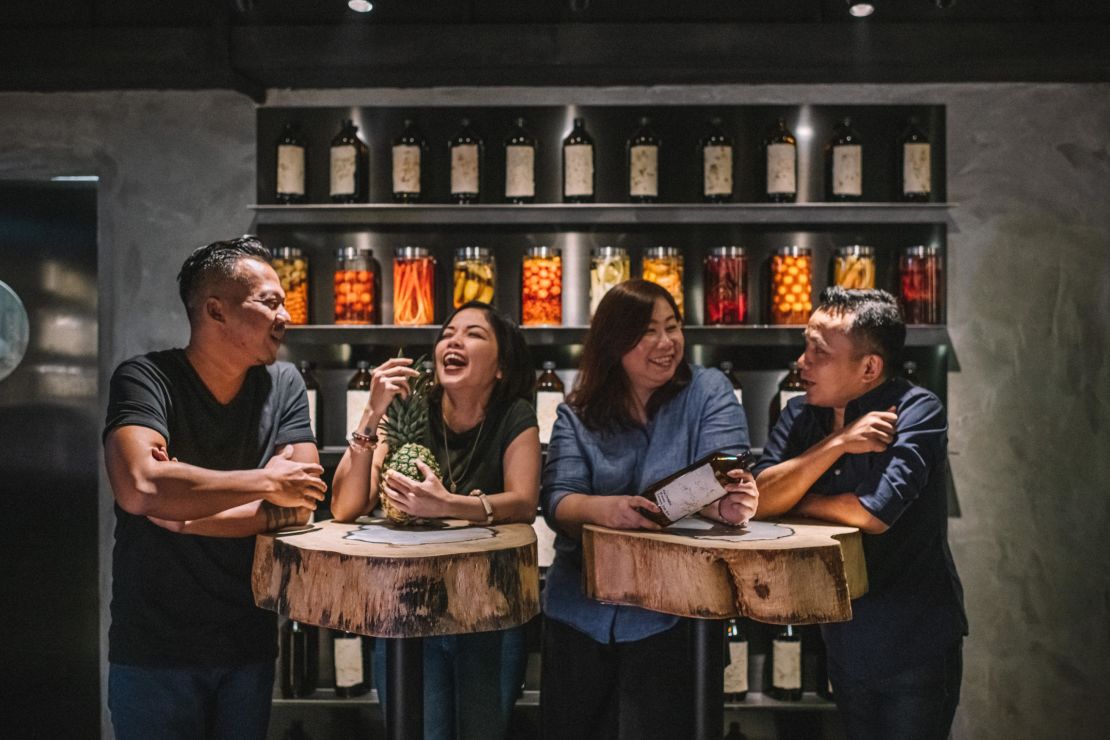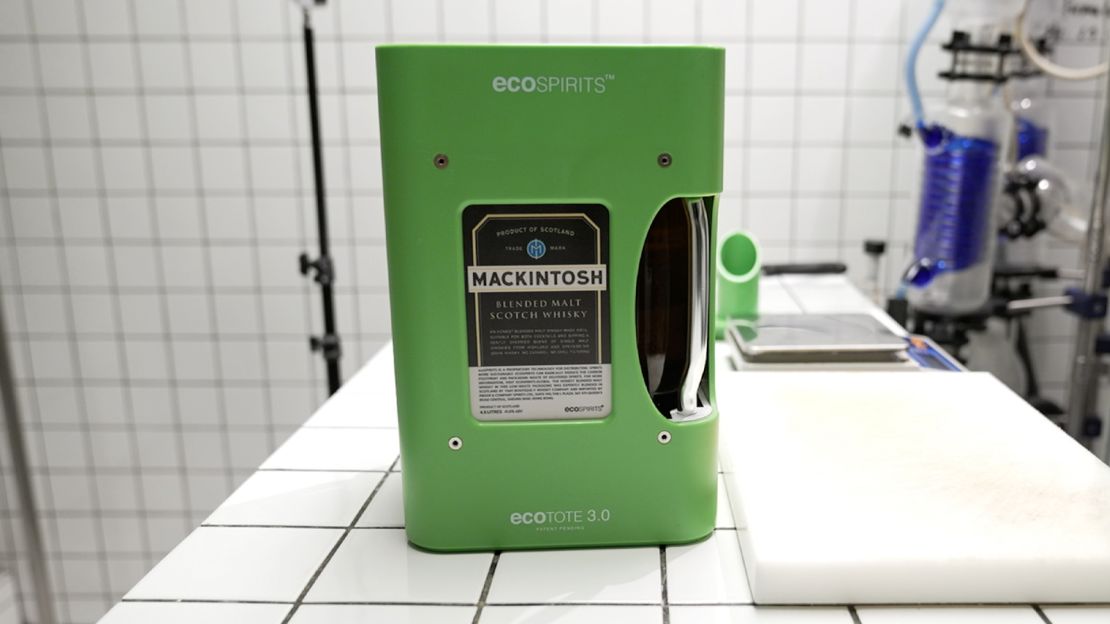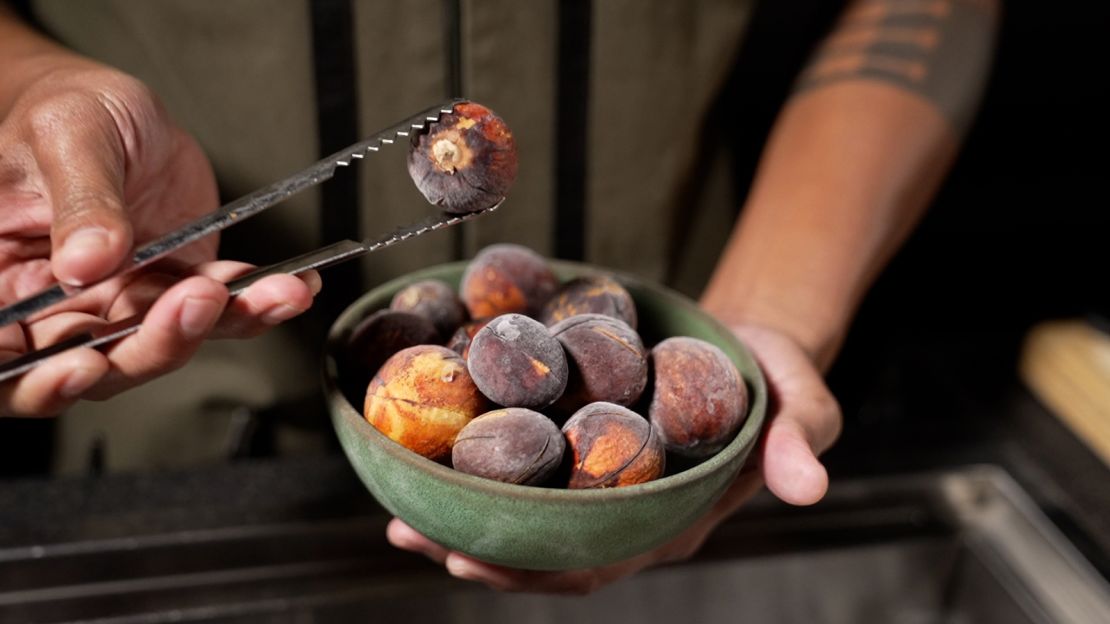At first glance, Penicillin is like any other upscale bar: dimly lit with plush green velvet benches around low tables, guests sipping on cocktails and snacking on bowls of salty chips, with sultry jazz humming in the background.
But there are a few not-so-conventional parts of this bar, too. Its white, tile-clad entrance doubles as a “laboratory” where its mixologists experiment with new flavors, and at the back, a “fermentation room” houses jars of home-brews.
It’s all part of a broader concept – from drinks to furniture – built around reducing waste and minimizing carbon emissions.
“What we do here is a bit different from other bars and restaurants in Hong Kong,” says Agung Prabowo, who co-founded the bar in November 2020 with long-time business partner and fellow mixologist Roman Ghale, and their wives, Laura Prabowo and Katy Ghale, respectively.

Not even six months into operations, the bar debuted at #30 on Asia’s 50 Best Bars 2021 list and won the Sustainable Bar Award.
Describing itself as Hong Kong’s first “closed-loop bar,” Penicillin is working towards zero waste and hopes to inspire other venues to do the same.
A culture of convenience
Also the brains behind The Old Man, Asia’s best bar 2019, veteran bartenders Agung and Roman have witnessed first-hand the waste in the hospitality industry during their combined four decades of experience. Their goal at Penicillin is to get as close to zero waste as possible, says Roman.
Hong Kong isn’t the easiest place to start a green business; it has a culture of convenience that is creating a sustainability crisis.
In 2019, just 29% of Hong Kong’s nearly 5.7 million metric tons of waste was recycled – and it appears to be a downward trend. Government data shows that Hong Kong’s recycling rates have fallen over the past decade, which means while less waste was produced, the amount going to landfill still increased by 21%.
For the team at Penicillin, the goal is to turn single-use culture on its head, and the team is constantly looking for new ways to reuse, recycle and minimize waste. Lemons, for instance, are squeezed for their juices, and the remaining pulp, seeds and skin are separated to be brewed into sparkling lemon “wine” in the bar’s fermentation room, or dried for cocktail garnishes, says Agung.
“We have to think twice before we put anything in the rubbish bin,” he says. “You can collect things for the next ingredient, rather than buy it new.”
It’s not just the drinks – designed by architecture firm Collective, sustainability has been built into the foundations of the bar with furniture and fittings made locally from recycled materials.
Trees uprooted during the 2018 Typhoon Mangkhut have been turned into tables and finished with recycled aluminum soda cans, while the LED wall lights are rescued tubes from Hong Kong’s iconic neon street signs. Every detail, from the recycled-paper business cards to the custom-made recycled-cotton uniforms, has been carefully considered.
“There’s actually fun ways to do sustainability,” says Agung.
An eco-spirit solution
Penicillin isn’t the only business working to clean up the drinks industry. While bars and restaurants around the world are trying to recycle and reduce waste, many of the industry’s most unsustainable elements are in the manufacturing and transportation of alcohol.
That’s where Singapore startup EcoSPIRITS saw a gap in the market. Its closed-loop distribution system processes premium spirits direct from distillers into its EcoTOTE, a refillable 4.5-liter, tamper-proof bottle. Bars can then refill their branded spirit bottles on-site, and once the tote is empty, it gets picked up when the new order arrives.

This eliminates the need for new, carbon-intensive branded glass bottles to be created, says EcoSPIRITS founder Paul Gabie.
“You’re not only reducing costs for the supply chain; the venues are getting the same spirit at a lower cost,” says Gabie. “You have this very powerful, quantifiable reduction in physical waste and CO2 footprint, and those are easy propositions for the industry.”
EcoSPIRITS claims its process can save 90% of the CO2 footprint of packaging and delivering spirits, which helps the bottom line, too. Gabie estimates bars save between 10 to 25% on spirits, as manufacturers save during production and distribution – meaning they can offer venues a more competitive price.
Penicillin is one of the nearly 700 bars in the Asia-Pacific region working with EcoSPIRITS, helping them save 150 grams of carbon emissions per cocktail, according to Penicillin. One of its drinks – “One Penicillin, One Tree” – actually gives back to the environment, with a tree planted in Borneo for each one purchased.
A community effort
While some businesses are reluctant to adopt sustainable solutions because of the perceived expense, Roman says setup costs are comparable to any other bar, with more potential for long-term savings. “People are always talk about sustainability costing a lot, but actually it’s not,” he says. “It’s time-consuming though – you need to have a lot of self-discipline.”

Penicillin is now trying to include the community in its sustainable solutions through collaborations with local businesses – which includes collecting oyster shells from a local seafood restaurant to redistill with whiskey for cocktail tinctures, and reusing avocado pits from a Mexican eatery as ice cubes. They are now also making soaps and hand sanitizers in-house with waste alcohol and lemon peel, says Agung.
The team hopes that others in Hong Kong’s food and beverage industry will be inspired to make positive, sustainable changes.
“We want to do something for nature that’s not about ourselves – something for our kids, a step forward,” says Roman. “That’s why we want to do these sustainable things.”











